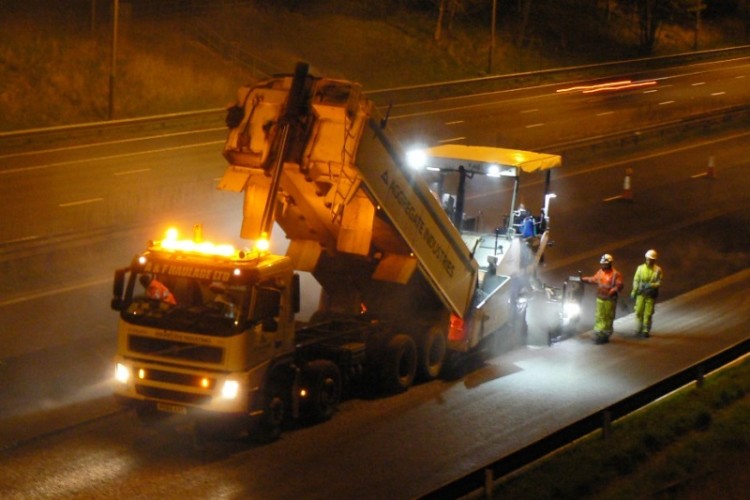Working on the M6 between junctions 28 and 27 near Leyland, the gang placed more than 1,100 tonnes of asphalt over 13,200 square metres – four times higher than during an average resurfacing shift.
The project, trialling a new resurfacing method, saw all preparation work taking place on a Friday night including planing off the existing road surface and repairing deep cracks and potholes. Then the asphalt was laid on Saturday night
A lane closure was kept in place during the day on the Saturday to protect the unfinished road surface and meant crews could focus entirely on laying the new 50mm deep tarmac on the Saturday night. Resurfacing subcontractor was Aggregate Industries.
The normal method of working would have required workers to be out on the motorway for seven nights to allow small sections of the carriageway to be repaired and resurfaced each night.
Highways England project manager John Lyssejko said: “We’re keen to do things differently, maintain high standards and reduce the impact on drivers and this new method of working ticks every box.

“Everyone worked really hard on the planning and on the night to make it work, and the response has been very positive. Now we know how well it works, and we are confident that we can maintain safety, we can start to look to use the method elsewhere on the network.
“We will continue to challenge how we plan and carry out resurfacing work so we can keep disruption to a minimum and ensure drivers can benefit from safer and smoother journeys in the future.”
He said that the new way of working meant all of the work could be completed over two nights, with no near misses or safety incidents recorded. All road markings, reflective road studs and traffic level detectors in the road surface were also replaced.
The crew of 25 laid an average of 163.7 tonnes of road surface every hour with a total of 1,146.3 tonnes laid during the Saturday night shift. They used the following machinery:
- 14 tippers
- 3 rollers
- 3 traffic management vehicle
- 2 crew buses
- 1 planer
- 1 paver
- 1 sprayer
- 1 sweeper
- 1 backhoe loader
- 1 detectors wagon
- 1 line marking and stud wagon.
Got a story? Email news@theconstructionindex.co.uk



